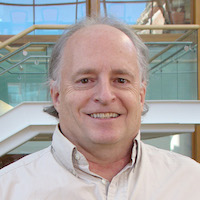Miller receives supercomputer grant to investigate multiphase porous medium systems
December 17, 2019

Dr. Cass Miller
As part of their research into multiphase flow in porous medium systems, Cass T. Miller, PhD, Okun Distinguished Professor of environmental sciences and engineering at the UNC Gillings School of Global Public Health, William G. Gray, PhD, research professor of environmental sciences and engineering, and Jan F. Prins, PhD, professor of computer science, have been awarded 340,000 node-hours on the Oak Ridge Laboratory Computing Facility’s Summit supercomputer. This award was given by the U.S. Department of Energy’s Innovative and Novel Computational Impact on Theory and Experiment (INCITE) program. This current award represents the seventh year that Miller’s group has been supported under this prestigious program.
The Oak Ridge Laboratory hosts some of the country’s most advanced supercomputers for projects that tackle science’s most challenging questions. Researchers who are awarded time allotments from the INCITE program are seeking answers to questions that must be calculated using a scale of computation that cannot be performed anywhere else in the world. These transformational advances in science include understanding supernovae explosions, exploring cancer therapy through physical genomics and simulating high-pressure gas turbines for more efficient aircraft propulsion. This year, INCITE has awarded 47 projects access to the supercomputers at the Oak Ridge Laboratory.
The research of Miller and his team seeks to describe how mass, momentum and energy move in systems that contain two or more fluids and a solid phase (called multiphase porous medium systems). These systems exist in nature, as well as in engineered and organismic systems. They are applicable to many areas of industry, including hydraulic fracturing, carbon capture and storage, groundwater remediation and biomedical research.
In previous work, Miller and his team derived the thermodynamically constrained averaging theory (TCAT), which enables the formulation of mechanistic mathematical models from first principles — basic, foundational concepts that we know to be true. Because these models are innovative, they must be evaluated and validated, which is the purpose of the INCITE award. The simulations that will be performed will be among the largest simulations of environmental systems ever reported, with computational grids resolved at up to 100 billion locations.
Miller’s research into multiphase porous medium systems has interdisciplinary impacts, as exemplified by his work with UNC’s Sustainable Access to Clean Water Creativity Hub, which seeks to develop water filters that make purification more energy efficient.
“It could be said that most things in the universe are some subset of a multiphase porous medium system,” said Miller. “Some applications include sequestration of carbon dioxide, analysis of the risks due to hydraulic fracturing, and contaminant remediation. Our work is also being used to describe tumor growth. There is a huge range of potential applications of this basic science work, which matches well with the transformation science objectives of the INCITE program.”
Contact the Gillings School of Global Public Health communications team at sphcomm@listserv.unc.edu.
